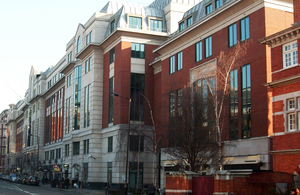Major package of reforms to increase passenger numbers
Series of changes commuters to improve buses and give greater value for money.

Commuters and bus passengers across England will see better buses, more innovative services, and greater value for money. This is thanks to a series of changes announced today (26 March 2012) by Local Transport Minister Norman Baker.
These changes will help encourage more people to travel by bus, helping to cut congestion and carbon emissions. It will also give greater control to transport authorities in dealing with bus issues at a local level.
The latest reforms include:
- new regulations to ensure healthy competition between bus companies. This is in response to the Competition Commission report in to the local bus market
- support to local authorities in delivering effective, innovative public transport services for local communities through the Bus Service Operators Grant
- an extra £15 million to help increase investment in smart ticketing equipment, particularly among small and medium-sized bus companies
Local Transport Minister Norman Baker said:
My vision is for a bus service that is reliable, flexible, offers competitive prices, smarter ticketing and provides passengers with a service they want to use time and again. Hard on the heels of the announcement of over £100 million of new funding for better and greener buses, today I have agreed an additional £15 million for smart ticketing. By devolving funding to local authorities it now gives them the power to tackle local issues on the ground and develop practical solutions to community problems.
This cannot be a one size fits all approach. Each local bus market has its own issues and challenges. The focus over the coming months is on guiding, empowering and encouraging local partners to be efficient, innovative and creative in coming up with solutions to the transport needs of local people.
The new proposals are a response to the need to reform bus subsidy (Bus Service Operators Grant) and the recently concluded Competition Commission investigation into the bus market. Having worked closely with bus operators, local councils, Local Government Association, the Passenger Transport Executive Group, the Confederation for Passenger Transport and the Community Transport Association, there are several changes being brought in:
- subsidy payments: a proportion of these will now be devolved to local authorities, rather than paid to bus companies - the government recognises that every area has their own travel issues and transport needs. It will now be up to authorities to decide how this money is spent
- competition barriers: will be eliminated and new regulations developed to prevent anti-competitive practices by bus operators - the department will work closely with local councils to offer guidance on developing reasonably-priced tickets that can be used on any bus
- smart ticketing: we are providing an extra £15 million to operators of local bus services that do not have smart ticketing equipment installed on their buses - this will help meet the aim that by 2014, the majority of journeys by public transport be made using a smartcard
Notes to editors
For further information or to organise an interview with Local Transport Minister Norman Baker email melanie.purkis@dft.gsi.gov.uk or call 0207 944 4604.
Further information on today’s announcement
Further details on the policy paper
Bus Service Operators Grant: the local transport white paper (19 January 2011) committed the department to agree smarter ways to deliver Bus Service Operators Grant (BSOG), including taking into account any conclusions from the Competition Commission’s review of the bus market, by March 2012.
The rate at which Bus Service Operators Grant (BSOG) is paid will be reduced by 20% from 1 April 2012 due to the 2010 spending review.
BSOG was introduced as fuel duty rebate in 1964 and at present is paid directly to bus operators. The amount each operator receives is based on how much fuel their vehicles use.
The government also proposes to tighten the rules that determine which bus services receive subsidy so that it goes to truly local bus services and to exclude services such as rail replacement buses.
The Competition Commission’s report into the local bus market is available.
The government’s response to the Commission’s report is available.
Following consultation with the Welsh Assembly government, we intend to make regulatory changes that will remove the barriers facing bus companies in England (outside London) and Wales that attempt to engage in competition on new bus routes and in new bus markets.
The department is also developing with bus companies and local transport authorities guidance on developing reasonably-priced tickets that can be used on any bus, not just on those of a single company.
If the guidance does not achieve change, the department may need to legislate to bring about more multi-operator ticketing schemes and so, in consultation with the Welsh Assembly government. The department intends to explore by the end of this parliament opportunities to bring forward primary legislation to give local transport authorities more powers.
Smart ticketing: The department is committed to delivering, with operators and public sector bodies, the infrastructure to enable most public transport journeys to be undertaken using smart ticketing technology by December 2014.
News desk enquiries
Media enquiries 0300 7777 878
Switchboard 0300 330 3000